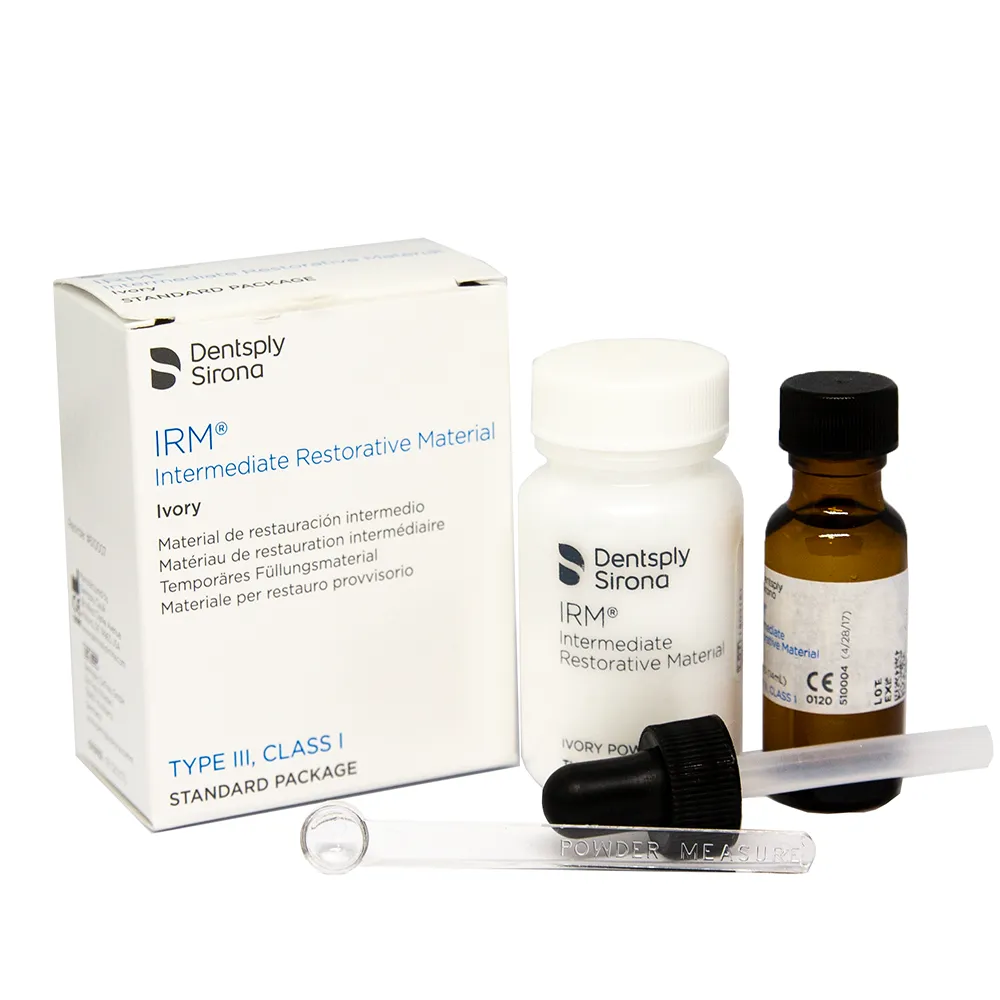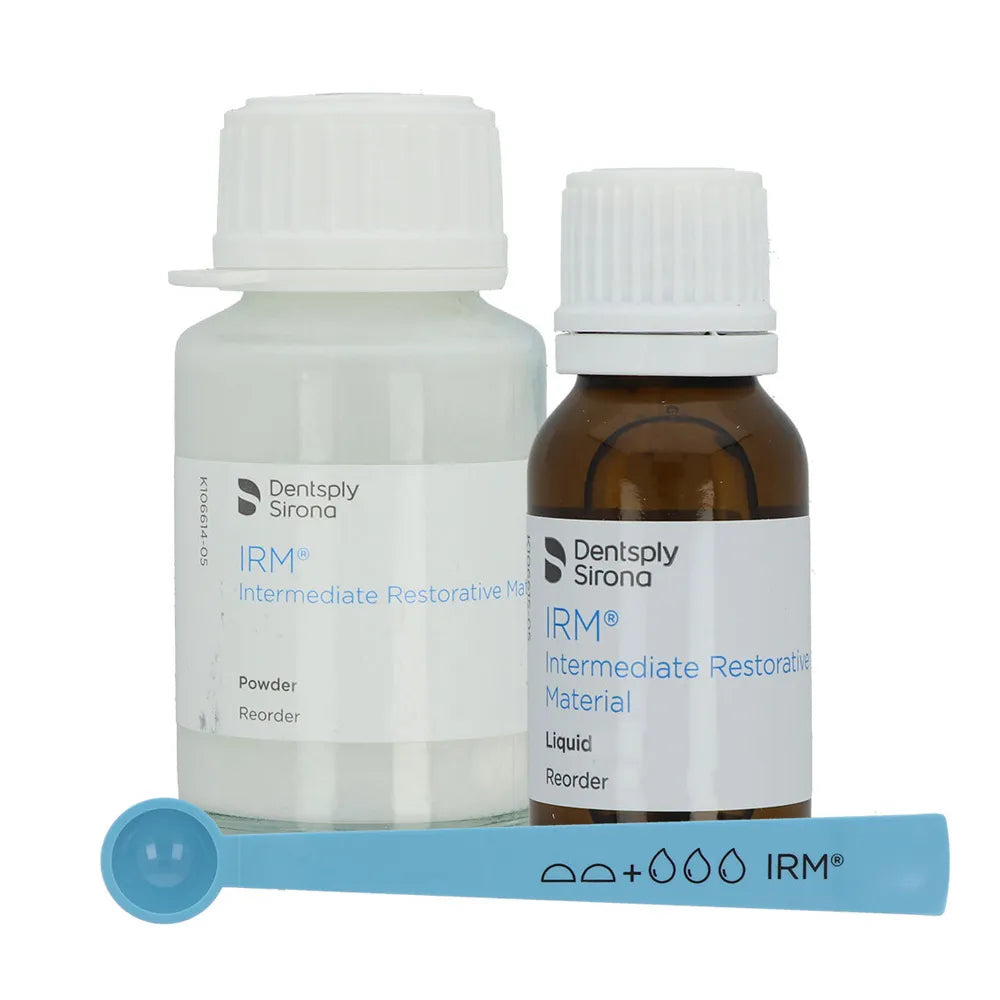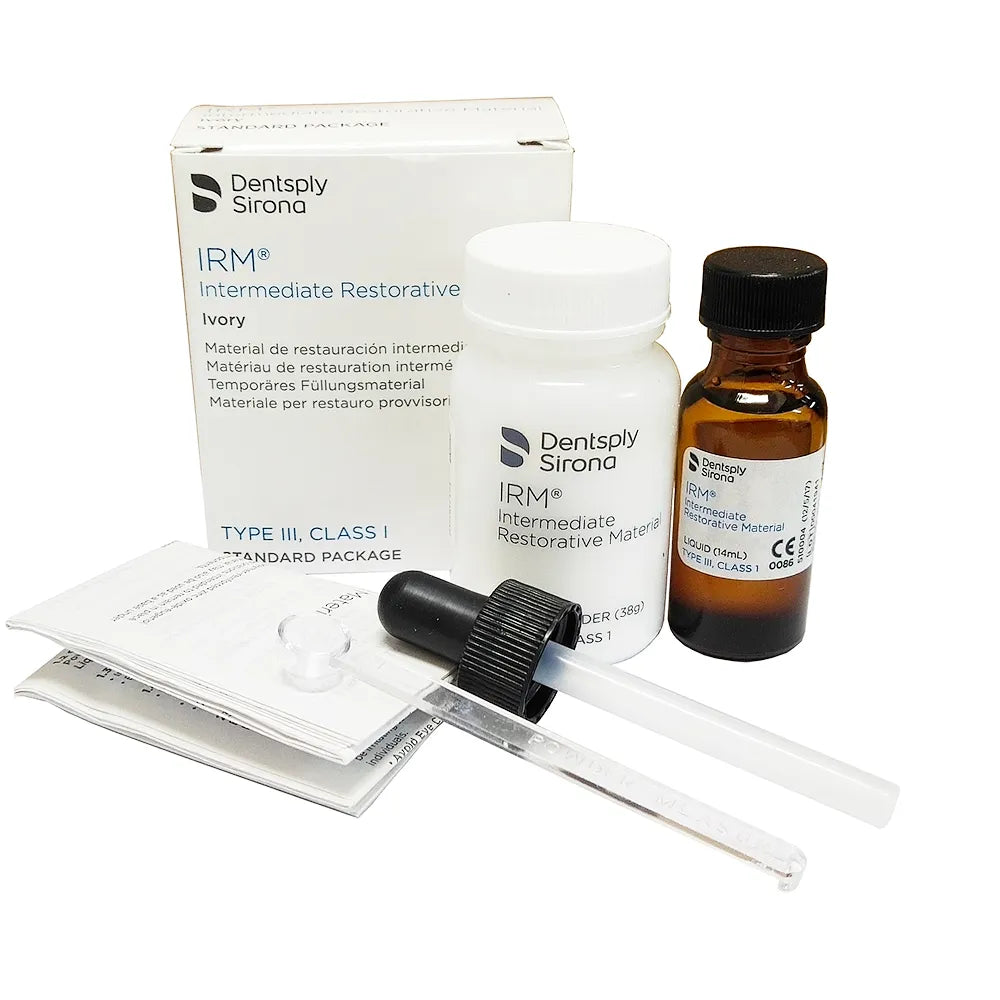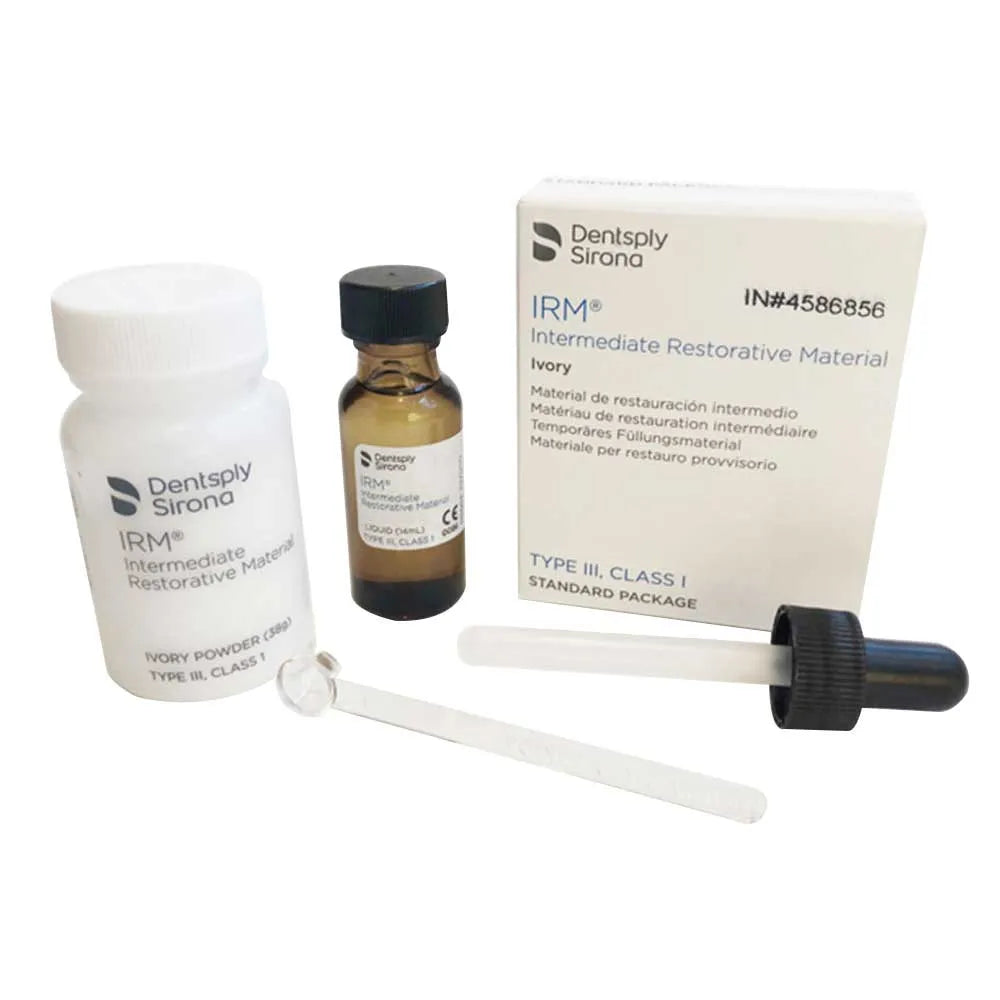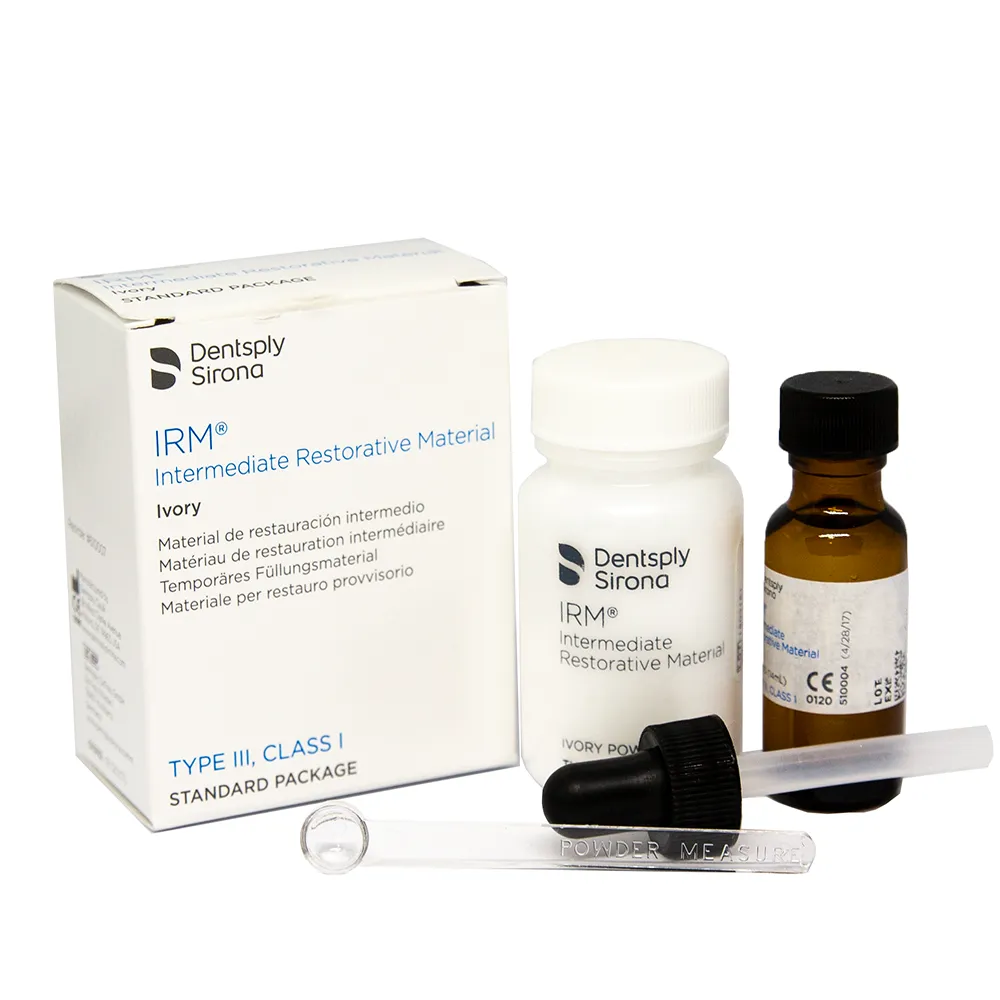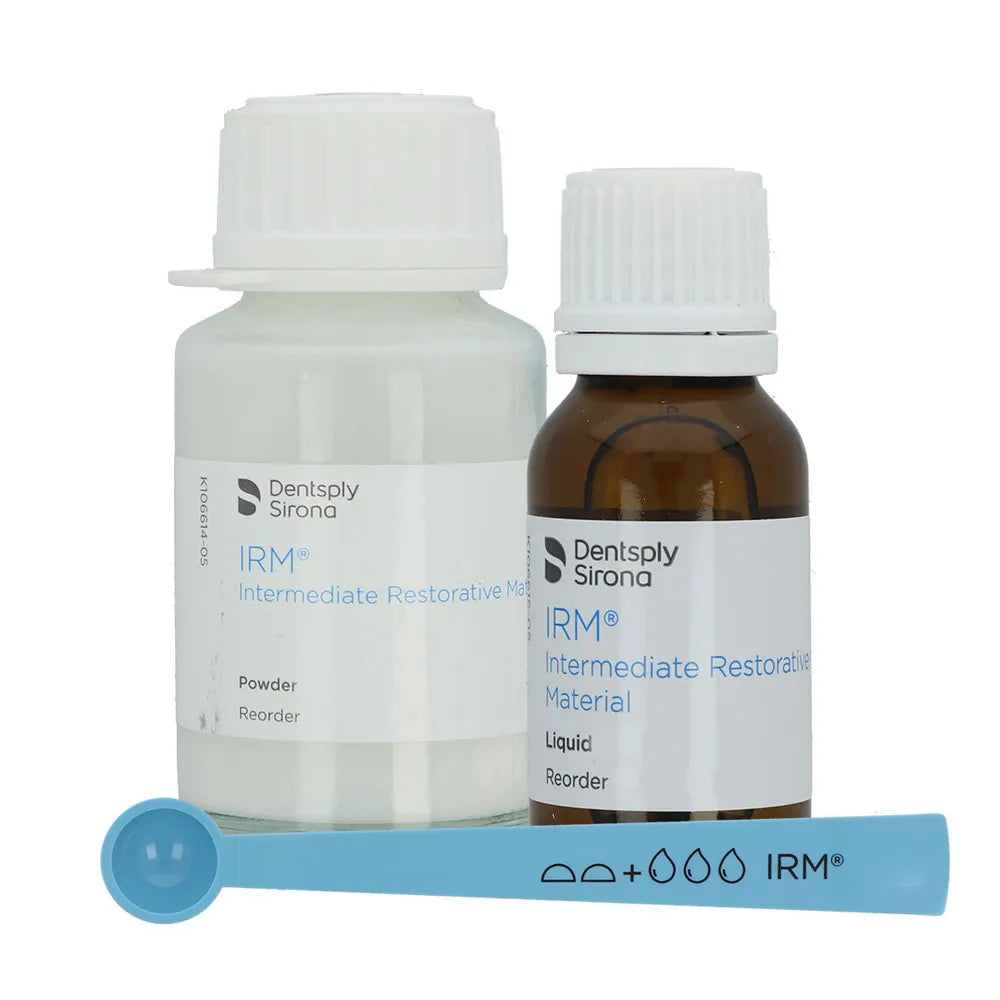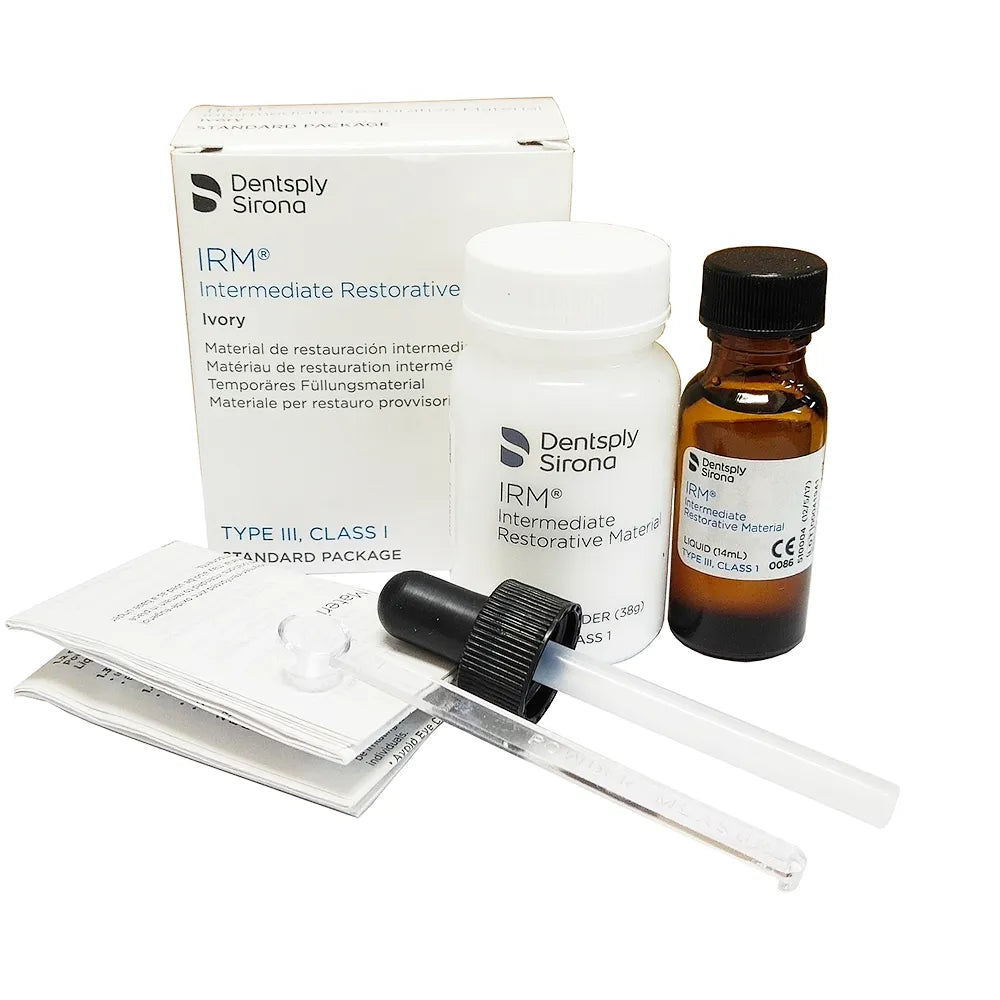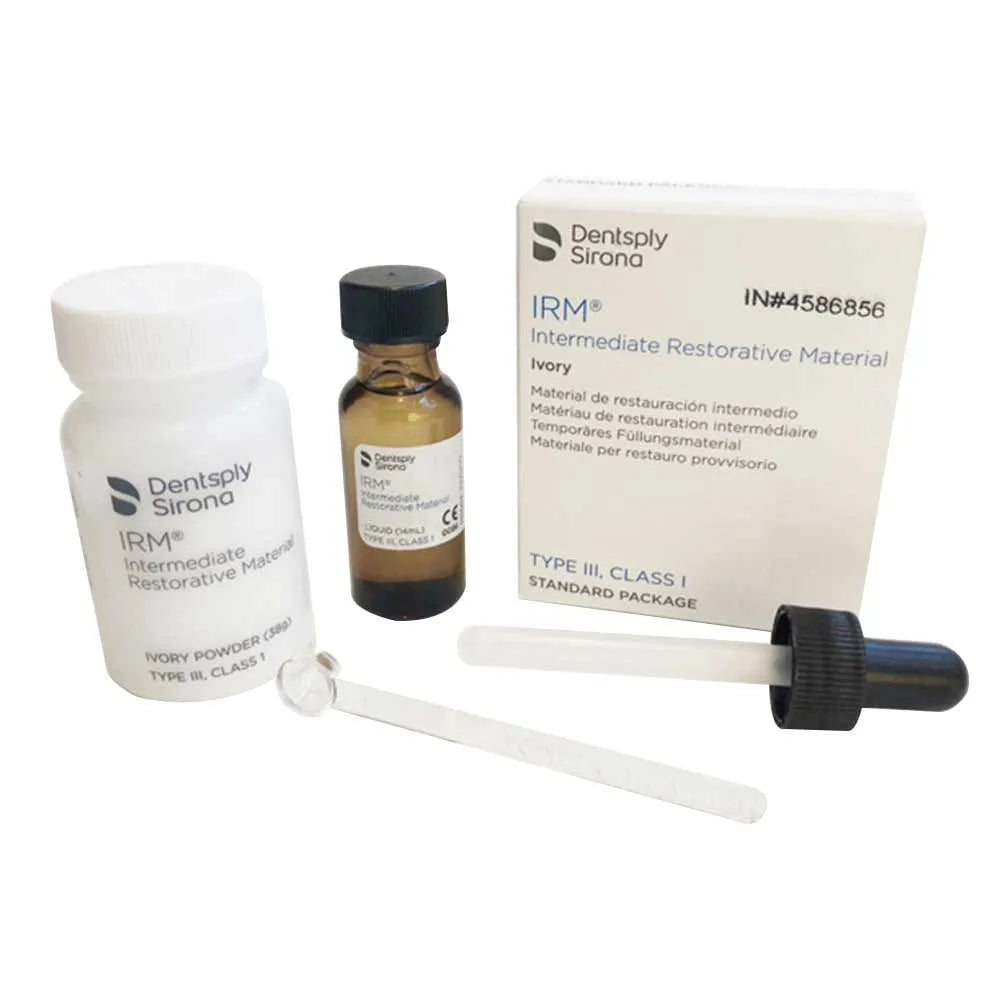Dentsply
Dentsply Intermediate Restorative Material (IRM)
Dentsply Intermediate Restorative Material (IRM)
Couldn't load pickup availability
IRM restorative is a specially formulated dental material designed for intermediate restorations with a limited lifespan of up to one year. It is composed of a combination of zinc oxide and eugenol, which work together to provide temporary dental restorations. The material is reinforced with polymers to enhance its strength and durability, ensuring reliable performance during the designated period. One of the key applications of IRM restorative is as an intermediate direct restorative filling material. It can be used by dental professionals to restore damaged teeth temporarily, providing functional and aesthetic benefits until a more permanent solution is implemented. Additionally, IRM restorative can serve as a base material under non-resin-containing permanent restorations. This means it provides a stable foundation for restorative materials and cements that do not contain resin components. It should not be used in patients who have a known hypersensitivity or severe allergic reaction to eugenol or any of the other components present in the material. Furthermore, direct pulp-capping, which involves placing the restorative material directly onto exposed dental pulp, should not be performed with IRM restorative. Additionally, it should not be used as a base under resin-containing adhesives, restoratives, or cements. IRM restorative is available in two convenient delivery forms. The powder/liquid version allows for easy hand mixing, providing flexibility and control during preparation.
INDICATIONS:
- It is an intermediate restorative material. In a clinical study, it was compared to other ZOE (Zinc Oxide- Eugenol) compositions and an EBA (Eugenol and o-ethoxy benzoic acid) formulation. Result: it was judged superior for both Class I and II restorations ( at one and two-year observations).
- Among the many applications are the restoration of deciduous teeth (when permanent teeth are two years or less from eruption); restorative emergencies; caries management programs; dental school clinics and public health dental programs.
- It is used as a base under cements and restorative materials that do not contain resin components, such as amalgams, and inlays and Onlays.
CONTRAINDICATIONS:
- Patients who have a known hypersensitivity or severe allergic reaction to eugenol, or any other components.
- Direct pulp capping
- Base under resin-containing adhesives, restoratives or cements.
ADVANTAGES:
- The eugenol content in the polymer-reinforced zinc oxide-eugenol composition gives the material sedative-like qualities on hypersensitive tooth pulp and is a good thermal insulator as well.
- Other physical-related clinical advantages include excellent abrasion resistance, good sealing properties and low solubility.
Features
Features
- Polymer-Reinforced Composition: IRM restorative is reinforced with polymers, enhancing its strength and durability. This ensures that it can withstand the functional demands of the restored tooth during its temporary placement
- Zinc Oxide-Eugenol Composition: The combination of zinc oxide and eugenol in IRM® restorative provides several benefits. Zinc oxide contributes to the material's strength and stability, while eugenol offers antibacterial properties and soothing effects on the dental pulp.
- Hand Mixing and Machine Mixing Options: IRM restorative is available in different delivery forms to accommodate dental professionals' preferences.
Description
Description
Specification
Specification
COMPOSITION:
Powder:
- Zinc oxide
- Magnesium oxide
- Zinc acetate
Liquid:
- Eugenol
- Acetic acid
Storage conditions:
- Store with original (not dropper cap) caps tightly closed in a well-ventilated place at temperatures between 10 °C and 24 °C (50 °F and 75 °F).
- Protect from moisture.
- Do not freeze.
- Do not use after the expiration date.
Packaging
Packaging
- 1 x Powder Bottle (38g)
- 1 x Liquid Bottle (14mL)
Direction to use
Direction to use
Cavity preparation
- Isolate the field of operation in a preferred manner. A rubber dam is recommended.
- Cavity preparation must provide for the mechanical retention of the product.
- If caries are present, completely excavate using low-speed and/or hand instrumentation.
- Place matrix and wedge where indicated.
- Gently dry preparation with a cotton pellet. Avoid desiccation.
Pulp protection
- In deep cavities cover the dentin close to the pulp (less than 1 mm) with a hard setting calcium hydroxide liner (Dycal calcium hydroxide liner, see complete Instructions for Use
Dispensing and mixing
- Before dispensing, fluff powder (tumble the powder bottle) to assure uniform bulk density of contents. Fill the measuring scoop to excess without packing.
- Level scoop with the bottle insert. Dispense two level scoops of powder onto a clean, non-absorbent mixing pad or glass slab. Larger restorations may require additional scoop(s).
- Using the dropper cap, dispense three drops of liquid for two level scoops of powder. After dispensing the liquid, replace the original cap immediately to prevent evaporation and subsequent contamination.
Placement
- Mixed material may be carried to the preparation with a suitable placement instrument. Adapt, contour, and shape with appropriate instruments. Technique Tip: Dipping the instrument into dry powder left on the pad before using to adapt the material will facilitate placement and minimize sticking.
Use as an intermediate restorative material
- Trim excess material. Material may be smoothed by lightly burnishing. The initial set occurs approximately 5 minutes from the start of mixing. Increased temperature, humidity, and powder/liquid ratio may accelerate the setting.
- Upon set, remove the matrix band if present. Check and adjust occlusion as needed. Additional carving or occlusal adjustment may be accomplished with a round bur. Avoid gouging material with sharp burs at high speed. Additional polishing is not recommended.
- Periodically evaluate the intermediate restoration until the final restoration is indicated. The intermediate restoration should be removed and the final restoration completed within one year of placement.
Use as a protective base
- The product is a protective base for non-resin-containing restorative material, such as amalgam or gold.
Additional info
Additional info
- Country Of Origin: United States of America
- Manufacturer: Dentsply
Warranty
Warranty
Warranty is not applicable for this product.
Product Related Questions
Product Related Questions
Question: Can it be used for temporary crown cementation ?
Answer: No, Dentsply Intermediate Restorative Material (IRM) is not specifically indicated for temporary crown cementation.
Question: What is IRM restorative?
Answer: IRM restorative is a polymer-reinforced zinc oxide-eugenol composition material used for intermediate dental restorations. It is designed to be a temporary solution that remains in place for up to one year.
Question: When is IRM restorative used?
Answer: IRM restorative has two main indications. It is used as an intermediate (temporary) direct restorative filling material, providing a temporary restoration until a permanent solution can be applied. It can also be used as a base material under non-resin-containing permanent restorations, offering stability and support.
Question: Does IRM restorative comply with any standards?
Answer: Yes, IRM® restorative complies with the specifications outlined in ISO 3107 for type II materials. This ensures that the product meets the necessary quality and performance standards.
Question: What are the delivery forms of IRM restorative?
Answer: IRM® restorative is available in a powder/liquid version for hand mixing, providing flexibility in preparation. Additionally, there is an alternative option called IRM® Caps™ restorative, designed for machine mixing, which offers convenience and consistency.
Share
